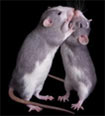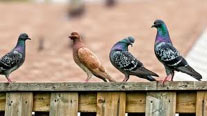Social Behavior

 How is behavior affected by the social context in which it occurs? How does such behavior relate to non-social behavior? We are studying such questions from several different angles, using custom-built apparatus designed to mimic some key features of complex social environments with rats and pigeons while maintaining the rigor of the laboratory methods.
How is behavior affected by the social context in which it occurs? How does such behavior relate to non-social behavior? We are studying such questions from several different angles, using custom-built apparatus designed to mimic some key features of complex social environments with rats and pigeons while maintaining the rigor of the laboratory methods.
Social decision making
We are exploring the social dynamics of decision making in projects using laboratory models of foraging environments. How are such decisions affected by the types and distributions of resources in the environment as a whole? How are they affected by the presence of other animals competing for the same resources? How are they affected by social hierarchies among the group? How and when do social alliances develop? How does the behavior of individual animals relate to the behavior of the group as whole? Do group-level processes arise as a simple product of the behavior of the individuals, or are such processes emergent -- not reducible the sum total of individuals? These are some of the questions currently under investigation.
In one project, groups of rats forage in a free-ranging apparatus with resources available in distinct locations. In a second project, groups of pigeons live continuously in a free-flying aviary, with resources available in a single location. In both experiments, we are exploring the impact of resource distribution and social dynamics on decision making at both the individual and group level. Both experiments open exciting new ways to look at how the behavior of an individual affects, and is affected by, the social context in which it occurs.
Cooperation and pro-social behavior
We are also exploring the costs and benefits of social decision making in a laboratory model of social behavior. Under what conditions is pro-social behavior such as cooperation developed and maintained? Is it more likely with familiar than with stranger rats? Is it more likely if the rat received help in the recent past? Is a rat more likely to help a rat more in need than another? At what cost does such pro-social behavior break down—what price is the animal willing to pay to produce it? How do such prices relate to other prices, such as the price of food? Using well-known reward scaling techniques, we aim to better quantify the reward value of social variables—an important first step in developing a behavioral-economic conception of social behavior.